What is 11Q1 – 11Q Paleo Leviticus?
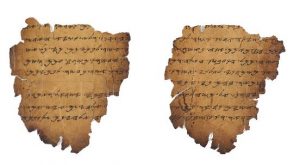
Paleo Leviticus is a collection of fragments and an awe inspiring scroll portion that have been preserved from the First Temple period (c. 1000 to 586 B.C.E.) This is the same era as the PaleoGenesis fragments (4Q11 – 4Q). The Paleo Leviticus collection is written in Paleo-Hebrew which is an older script than the modern Hebrew/Aramaic script. It’s easy to date because Paleo-Hebrew virtually disappeared when the Babylonians took the Israelites into captivity in 586 B.C.E.
It’s important to note, however, that just the style of text is not enough to date the scrolls and fragments. The age of the parchment itself can differ from the style of writing. For example, if I took a piece of paper and wrote a paragraph on it in King James era English, it does not make my writing as old as 1611. It just means that the style of writing is that old. Thus, many scholars date Paleo Leviticus much later than the date range of the style of writing. The large scroll is believed by many to only be as old as 65 B.C.E. which means it would be 500 years less old as it’s style of writing. However, dating is somewhat of an art form and 10 dating specialists sometimes end up with 10 different dates. For a deeper discussion I recommend reading this brief lecture on “The Writing World of the Dead Sea Scrolls” by Rochelle Altman.
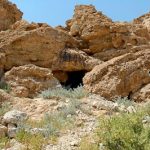
The large Leviticus scroll is the most popular item in the collection because so much of it was preserved. The scroll was discovered in 1956 inside Cave 11. Cave 11 was one of the last caves to be explored. Cave 11 is also where the renowned “Temple Scroll” was found in 1967.The Paleo Leviticus scroll was first opened fourteen years after after it was discovered. Inside of the scroll is portion of Leviticus 22-27.
The fragments that were found in Paleo Leviticus are from Leviticus chapters 4, 10, 11, 13, 14, 16, 18-22. Like the Paleo Genesis-Exodus fragment collection many of the fragments from Leviticus are unreadable due to ink wear or damage to the parchment. Even the well preserved scroll is missing the bottom 1/5th portion of the scroll, as if the scroll was sitting at an upright angle in a pool of water or some contaminant so only a portion deteriorated. The pictures of this scroll will make it evident that it was not entirely resting is a safe place.
What in the 11Q1 – 11Q Paleo Leviticus scroll?
21 Whoever offers a sacrifice of peace offerings to Yahweh to accomplish a vow, or for a freewill offering, of the herd or of the flock, it shall be perfect to be accepted. It shall have no defect. 22 Blind, injured, maimed, having a running sore, festering, or having a wart: you shall not offer these to Yahweh, nor make an offering by fire of them on the altar to Yahweh. 23 Either a bull or a lamb that has any deformity or lacking in his parts, that you may offer for a freewill offering; but for a vow it shall not be accepted. 24 You must not offer to Yahweh that which has its testicles bruised, crushed, broken, or cut. You must not do this in your land. 25 You must not offer the bread of your God from the hand of a foreigner as any of these; because they are corrupt. There is a defect in them. They shall not be accepted for you.’ ”
[..]
27 “When a bull, or a sheep, or a goat, is born, then it shall remain seven days with its mother; and from the eighth day and thenceforth it shall be accepted for the offering of an offering made by fire to Yahweh.
[..]
Leviticus 23
22 “ ‘When you reap the harvest of your land, you must not wholly reap into the corners of your field, and you must not gather the gleanings of your harvest. You must leave them for the poor, and for the foreigner. I am Yahweh your God.’ ”
23 Yahweh spoke to Moses, saying, 24 “Speak to the children of Israel, saying, ‘In the seventh month, on the first day of the month, shall be a solemn rest to you, a memorial of blowing of trumpets, a holy convocation. 25 You shall do no regular work; and you shall offer an offering made by fire to Yahweh.’ ”
26 Yahweh spoke to Moses, saying, 27 “However on the tenth day of this seventh month is the day of atonement: it shall be a holy convocation to you, and you shall afflict yourselves; and you shall offer an offering made by fire to Yahweh. 28 You shall do no kind of work in that same day; for it is a day of atonement, to make atonement for you before Yahweh your God. 29 For whoever it is who shall not deny himself in that same day; shall be cut off from his people.
[..]
Leviticus 24
9 It shall be for Aaron and his sons; and they shall eat it in a holy place: for it is most holy to him of the offerings of Yahweh made by fire by a perpetual statute.”
10 The son of an Israelite woman, whose father was an Egyptian, went out among the children of Israel; and the son of the Israelite woman and the man of Israel strove together in the camp. 11 The son of the Israelite woman blasphemed the Name, and cursed; and they brought him to Moses. His mother’s name was Shelomith, the daughter of Dibri, of the tribe of Dan. 12 They put him in custody, until Yahweh’s will should be declared to them. 13 Yahweh spoke to Moses, saying, 14 “Bring out of the camp him who cursed; and let all who heard him lay their hands on his head, and let all the congregation stone him.
[..]
Leviticus 25
28 But if he isn’t able to get it back for himself, then what he has sold shall remain in the hand of him who has bought it until the Year of Jubilee: and in the Jubilee it shall be released, and he shall return to his property.
29 “ ‘If a man sells a dwelling house in a walled city, then he may redeem it within a whole year after it has been sold. For a full year he shall have the right of redemption. 30 If it isn’t redeemed within the space of a full year, then the house that is in the walled city shall be made sure in perpetuity to him who bought it, throughout his generations. It shall not be released in the Jubilee. 31 But the houses of the villages which have no wall around them shall be accounted for with the fields of the country: they may be redeemed, and they shall be released in the Jubilee.
32 “ ‘Nevertheless the cities of the Levites, the houses in the cities of their possession, the Levites may redeem at any time. 33 The Levites may redeem the house that was sold, and the city of his possession, and it shall be released in the Jubilee; for the houses of the cities of the Levites are their possession among the children of Israel. 34 But the field of the pasture lands of their cities may not be sold; for it is their perpetual possession.
35 “ ‘If your brother has become poor, and his hand can’t support himself among you; then you shall uphold him. He shall live with you like an alien and a temporary resident. 36 Take no interest from him or profit, but fear your God; that your brother may live among you.
[..]
Leviticus 26
17 I will set my face against you, and you will be struck before your enemies. Those who hate you will rule over you; and you will flee when no one pursues you.
18 “ ‘If you in spite of these things will not listen to me, then I will chastise you seven times more for your sins. 19 I will break the pride of your power, and I will make your sky like iron, and your soil like bronze. 20 Your strength will be spent in vain; for your land won’t yield its increase, neither will the trees of the land yield their fruit.
21 “ ‘If you walk contrary to me, and won’t listen to me, then I will bring seven times more plagues on you according to your sins. 22 I will send the wild animals among you, which will rob you of your children, destroy your livestock, and make you few in number. Your roads will become desolate.
23 “ ‘If by these things you won’t be reformed to me, but will walk contrary to me; 24 then I will walk in wrath contrary to you; and I will strike you, even I, seven times for your sins. 25 I will bring a sword upon you that will execute the vengeance of the covenant. You will be gathered together within your cities, and I will send the pestilence among you. You will be delivered into the hand of the enemy. 26 When I break your staff of bread, ten women shall bake your bread in one oven, and they shall deliver your bread again by weight. You shall eat, and not be satisfied.
[..]
Leviticus 27
11 If it is any unclean animal, of which they do not offer as an offering to Yahweh, then he shall set the animal before the priest; 12 and the priest shall value it, whether it is good or bad. As you the priest values it, so shall it be. 13 But if he will indeed redeem it, then he shall add the fifth part of it to its valuation.
14 “ ‘When a man dedicates his house to be holy to Yahweh, then the priest shall evaluate it, whether it is good or bad: as the priest shall evaluate it, so shall it stand. 15 If he who dedicates it will redeem his house, then he shall add the fifth part of the money of your valuation to it, and it shall be his.
16 “ ‘If a man dedicates to Yahweh part of the field of his possession, then your valuation shall be according to the seed for it. The sowing of a homer of barley shall be valued at fifty shekels of silver. 17 If he dedicates his field from the Year of Jubilee, according to your valuation it shall stand. 18 But if he dedicates his field after the Jubilee, then the priest shall reckon to him the money according to the years that remain to the Year of Jubilee; and an abatement shall be made from your valuation. 19 If he who dedicated the field will indeed redeem it, then he shall add the fifth part of the money of your valuation to it, and it shall remain his.
What in the 11Q1 – 11Q Paleo Leviticus fragments?

Leviticus 4
23 if his sin in which he has sinned is made known to him, he shall bring as his offering a goat, a male without defect. 24 He shall lay his hand on the head of the goat, and kill it in the place where they kill the burnt offering before Yahweh. It is a sin offering. 25 The priest shall take some of the blood of the sin offering and put it on the horns of the altar of burnt offering. He shall pour out[1] the rest of its blood at the base of the altar of burnt offering. 26 All its fat he shall burn on the altar, like the fat of the sacrifice of peace offerings; and the priest shall make atonement for him concerning his sin, and he will be forgiven.
[..]
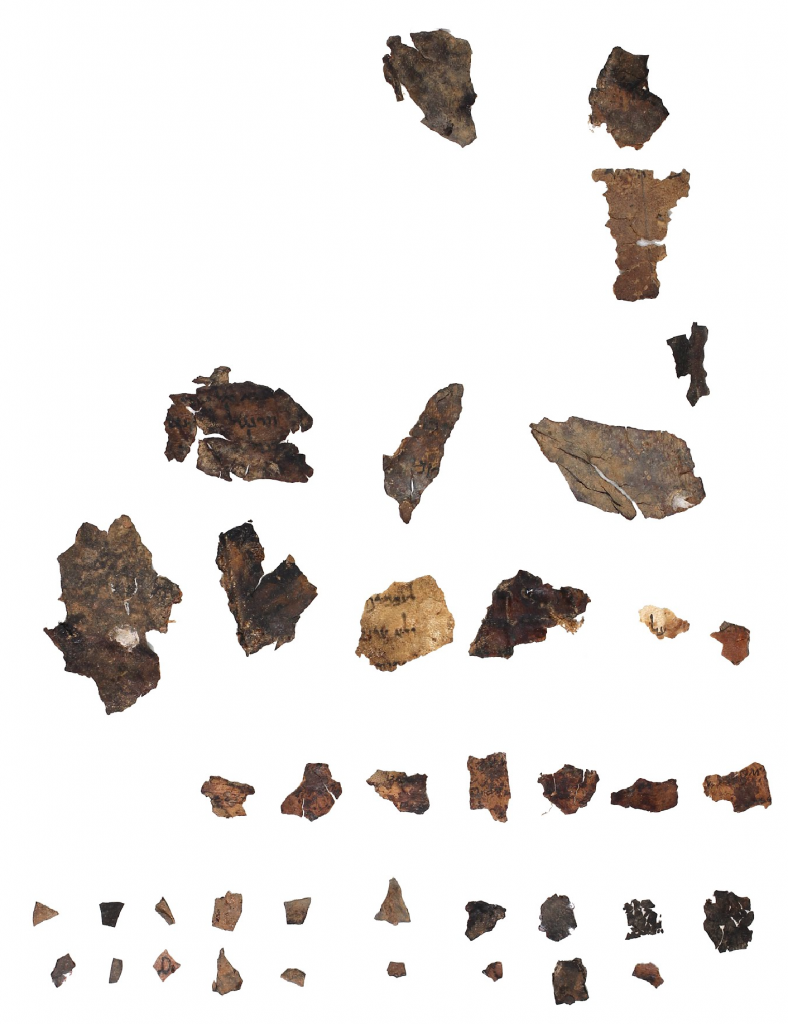
Leviticus 10
4 Moses called Mishael and Elzaphan, the sons of Uzziel the uncle of Aaron, and said to them, “Draw near, carry your brothers from before the sanctuary out of the camp.” 5 So they came near, and carried them in their tunics out of the camp, as Moses had said.
6 Moses said to Aaron, and to Eleazar and to Ithamar, his sons, “Don’t let the hair of your heads go loose, and don’t tear your clothes, so that you don’t die, and so that he will not be angry with all the congregation; but let your brothers, the whole house of Israel, bewail the burning which Yahweh has kindled. 7 You shall not go out from the door of the Tent of Meeting, lest you die; for the anointing oil of Yahweh is on you.” They did according to the word of Moses.
[..]
Leviticus 11
27 Whatever goes on its belly, among all animals that go on all fours, they are unclean to you. Whoever touches their carcass shall be unclean until the evening. 28 He who carries their carcass shall wash his clothes, and be unclean until the evening. They are unclean to you.
29 “ ‘These are they which are unclean to you among the creeping things that creep on the earth: the weasel, the rat, any kind of great lizard, 30 the gecko, and the monitor lizard, the wall lizard, the skink, and the chameleon. 31 These are they which are unclean to you among all that creep. Whoever touches them when they are dead shall be unclean until the evening. 32 Anything they fall on when they are dead shall be unclean; whether it is any vessel of wood, or clothing, or skin, or sack, whatever vessel it is, with which any work is done, it must be put into water, and it shall be unclean until the evening. Then it will be clean.
[..]
Leviticus 13
3 The priest shall examine the plague in the skin of the body. If the hair in the plague has turned white, and the appearance of the plague is deeper than the body’s skin, it is the plague of leprosy; so the priest shall examine him and pronounce him unclean. 4 If the bright spot is white in the skin of his body, and its appearance isn’t deeper than the skin, and its hair hasn’t turned white, then the priest shall isolate the infected person for seven days. 5 The priest shall examine him on the seventh day. Behold, if in his eyes the plague is arrested and the plague hasn’t spread in the skin, then the priest shall isolate him for seven more days. 6 The priest shall examine him again on the seventh day. Behold, if the plague has faded and the plague hasn’t spread in the skin, then the priest shall pronounce him clean. It is a scab. He shall wash his clothes, and be clean. 7 But if the scab spreads on the skin after he has shown himself to the priest for his cleansing, he shall show himself to the priest again. 8 The priest shall examine him; and behold, if the scab has spread on the skin, then the priest shall pronounce him unclean. It is leprosy.
9 “When the plague of leprosy is in a man, then he shall be brought to the priest;
[..]
39 then the priest shall examine them. Behold, if the bright spots on the skin of their body are a dull white, it is a harmless rash. It has broken out in the skin. He is clean.
40 “If a man’s hair has fallen from his head, he is bald. He is clean.
[..]
42 But if a reddish-white plague is in his bald head or the bald forehead, it is leprosy breaking out in his bald head or his bald forehead. 43 Then the priest shall examine him. Behold, if the swelling of the plague is reddish-white in his bald head, or in his bald forehead, like the appearance of leprosy in the skin of the body,
[..]
Leviticus 14
16 The priest shall dip his right finger in the oil that is in his left hand, and shall sprinkle some of the oil with his finger seven times before Yahweh. 17 The priest shall put some of the rest of the oil that is in his hand on the tip of[2] the right ear of him who is to be cleansed, and on the thumb of his right hand, and on the big toe of his right foot, upon the blood of the trespass offering. 18 The rest of the oil that is in the priest’s hand he shall put on the head of him who is to be cleansed, and the priest shall make atonement for him before Yahweh.
19 “The priest shall offer the sin offering, and make atonement for him who is to be cleansed because of his uncleanness. Afterward he shall kill the burnt offering; 20 then the priest shall offer the burnt offering and the meal offering on the altar. The priest shall make atonement for him, and he shall be clean.
21 “If he is poor, and can’t afford so much, then he shall take one male lamb for a trespass offering to be waved, to make atonement for him, and one tenth of an ephah of fine flour mingled with oil for a meal offering, and a log of oil;
[..]
52 He shall cleanse the house with the blood of the bird, and with the running water, with the living bird, with the cedar wood, with the hyssop, and with the scarlet;
[..]
54 This is the law for any plague of leprosy, and for an itch, 55 and for the destructive mildew of a garment, and for a house,
[..]
57 to teach when it is unclean, and when it is clean.
This is the law of leprosy.
Leviticus 15
2 “Speak to the children of Israel, and tell them, ‘When any man has a discharge from his body, because of his discharge he is unclean. 3 This shall be his uncleanness in his discharge: whether his body runs with his discharge, or his body has stopped from his discharge, it is his uncleanness in him all the days of his discharge of his body, even if his body stops the discharge, it is his uncleanness.[3]
4 “ ‘Every bed whereon he who has the discharge lies shall be unclean; and everything he sits on shall be unclean. 5 Whoever touches his bed shall wash his clothes, and bathe himself in water, and be unclean until the evening.
[..]
Leviticus 16
2 and Yahweh said to Moses, “Tell Aaron your brother not to come at just any time into the Most Holy Place within the veil, before the mercy seat which is on the ark; lest he die; for I will appear in the cloud on the mercy seat.
3 “Aaron shall come into the sanctuary with a young bull for a sin offering, and a ram for a burnt offering. 4 He shall put on the holy linen tunic. He shall have the linen trousers on his body, and shall put on the linen sash, and he shall be clothed with the linen turban. They are the holy garments. He shall bathe his body in water, and put them on.
[..]
34 “This shall be an everlasting statute for you, to make atonement for the children of Israel once in the year because of all their sins.”
It was done as Yahweh commanded Moses.
Leviticus 17
1 Yahweh spoke to Moses, saying, 2 “Speak to Aaron, and to all the children of Israel, and say to them, ‘This is the thing which Yahweh has commanded: 3 Whatever man there is of the house of Israel who kills a bull, or lamb, or goat in the camp, or who kills it outside the camp, 4 and hasn’t brought it to the door of the Tent of Meeting to offer it as an offering to Yahweh before Yahweh’s tabernacle: blood shall be imputed to that man. He has shed blood. That man shall be cut off from among his people. 5 This is to the end that the children of Israel may bring their sacrifices, which they sacrifice in the open field, that they may bring them to Yahweh, to the door of the Tent of Meeting, to the priest, and sacrifice them for sacrifices of peace offerings to Yahweh.
[..]
Leviticus 18
27 (for the men of the land that were before you had done all these abominations, and I have abhorred them and said to you “you shall inherit their land”[4] and the land became defiled); 28 that the land not vomit you out also, when you defile it, as it vomited out the nation that was before you.
29 “ ‘For whoever shall do any of these abominations, even the souls that do them shall be cut off from among their people. 30 Therefore you shall keep my requirements, that you do not practice any of these abominable customs, which were practiced before you, and that you do not defile yourselves with them, for I am Yahweh your God.’ ”
Leviticus 19
1 Yahweh spoke to Moses, saying, 2 “Speak to all the congregation of the children of Israel, and tell them, ‘You shall be holy; for I, Yahweh your God, am holy.
3 “ ‘Each one of you shall respect his mother and his father. You shall keep my Sabbaths. I am Yahweh your God.
4 “ ‘Don’t turn to idols, nor make molten gods for yourselves. I am Yahweh your God.
[..]
Leviticus 20
1 Yahweh spoke to Moses, saying, 2 “Moreover, you shall tell the children of Israel, ‘Anyone of the house of Israel, or of the strangers who live as foreigners in Israel, who gives any of his offspring to Molech; he shall surely be put to death. The people of the land shall stone him with stones. 3 I also will set my face against that person, and will cut him off from among his people because he has given of his offspring to Molech to Molech, to defile my sanctuary, and to profane my holy name. 4 If the people of the land all hide their eyes from that person, when he gives of his offspring to Molech, and don’t put him to death; 5 then I will set my face against that man, and against his family, and will cut him off, and all who play the prostitute after him, to play the prostitute with Molech, from among their people.
6 “ ‘The person that turns to those who are mediums, and to the wizards, to play the prostitute after them, I will even set my face against that person, and will cut him off from among his people.
[..]
Leviticus 21
6 They shall be holy to their God, and not profane the name of their God; for they offer the offerings of Yahweh made by fire, the bread of their God; therefore they shall be holy.
7 “ ‘They shall not marry a woman who is a prostitute, or profane. They shall not marry a woman divorced from her husband; for he is holy to his God. 8 You shall sanctify him therefore; for he offers the bread of your God. He shall be holy to you; for I Yahweh, who sanctify them, am holy.
9 “ ‘The daughter of any priest, if she profanes herself by playing the prostitute, she profanes her father. She shall be burned with fire.
10 “ ‘He who is the high priest among his brothers, upon whose head the anointing oil is poured, and that is consecrated to put on the garments, shall not let the hair of his head hang loose, or tear his clothes. 11 He must not go in to any dead body, or defile himself for his father, or for his mother.
[..]
[Translation courtesy of http://dssenglishbible.com/scroll11Q1.htm]
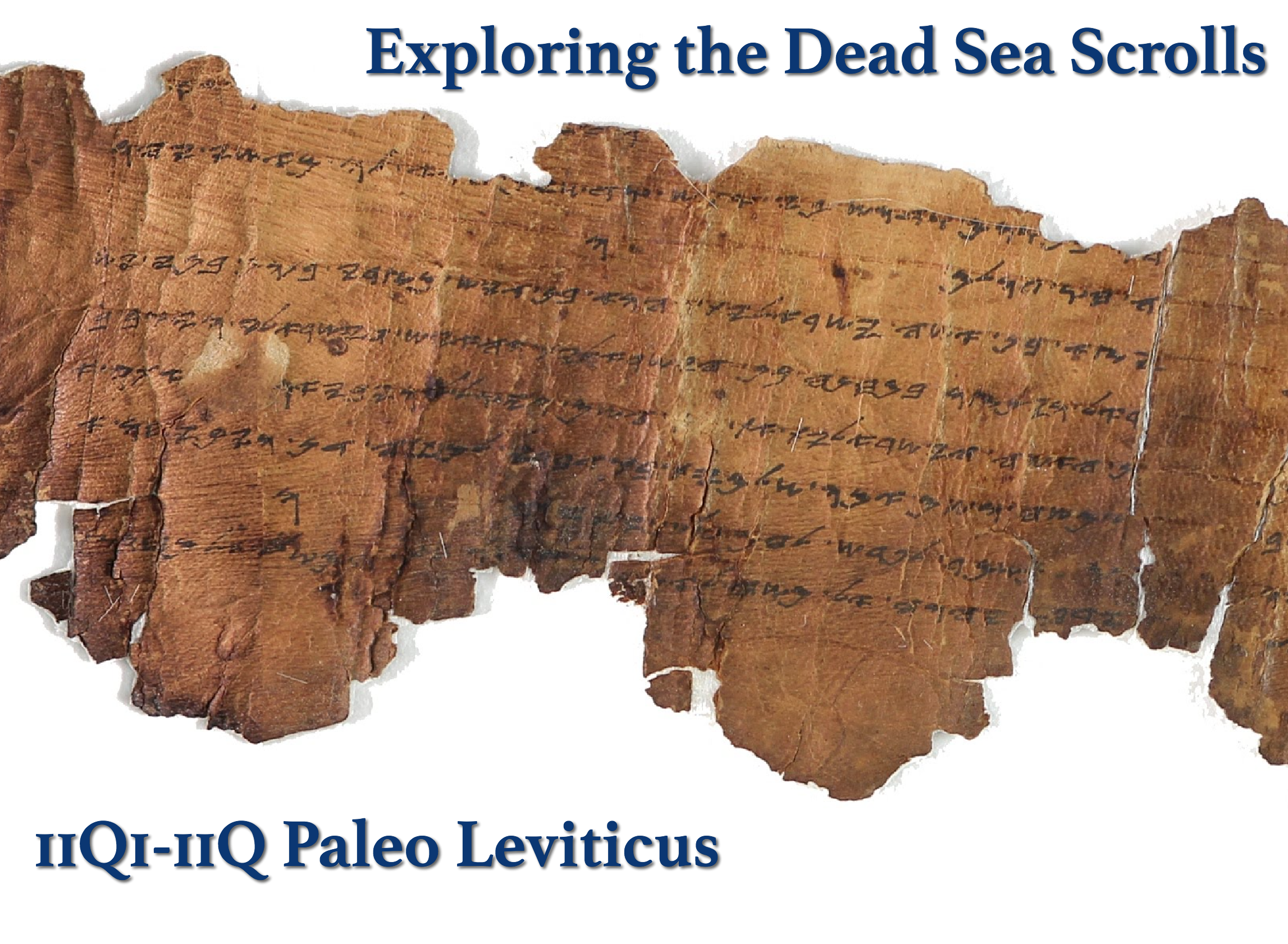

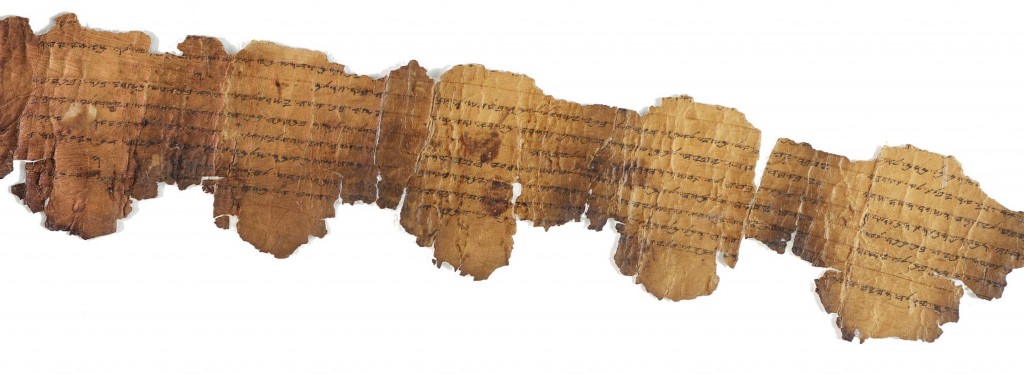
Are there any word “Elohim” found written in the Paleo Hebrew Leviticus fragments? If so I would like to know the fragment ID. Thank you.